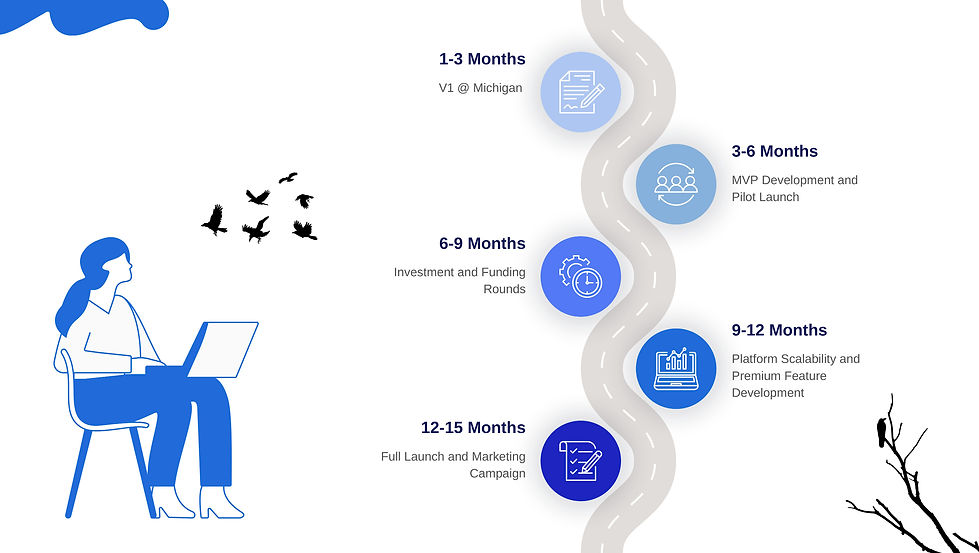
Role: UI/UX Designer
Collaborator: Zhengdong Peng, Anson Ye, Pattaraporn Chutipongvivet, Rachel Gonzalo, Vatsal Shah
Tools: Figma, Canva, Illustrator
Duration: 5 weeks
It's a project from Tech-Innovation Jam competition. Colley is an AI-powered platform that helps students and professors efficiently find research collaborators. We come up this idea with an interview with professor Brian from school of information. Then we carry out user research by carrying out bunches of user interviews to find the problems and corresponding solutions. Based on this research, we successfully demonstrate this product by providing the Figma prototype as well as the actual technical video demo.
Background
Academic networking is often inefficient, with scattered platforms, limited search capabilities, and overwhelming amounts of information. Researchers spend valuable time navigating outdated systems, missing potential opportunities for collaboration.
We conducted an interview with Dr. Brian Perron, a professor at the University of Michigan. He highlighted the challenge of keeping up with new research, emphasizing that academics spend too much time on repetitive and inefficient tasks rather than focusing on meaningful collaboration. He pointed out that many existing platforms attempt to create social media-like experiences for researchers but fail to address the real pain points—such as the difficulty of discovering relevant work and staying informed on the latest publications.


Problem
Inefficient Research Collaboration – Existing platforms lack precise academic matchmaking, making it difficult for researchers to find relevant collaborators efficiently.
Overwhelming Information Management – Researchers struggle to keep up with new publications, spending excessive time sifting through scattered sources without an optimized system for filtering and summarizing relevant studies.
Repetitive and Time-Consuming Tasks – Academics face unnecessary delays due to manual research discovery, disorganized reference management, and inefficient communication tools, reducing productivity and slowing research progress.
Solution
AI-Driven Profile Matching – Uses AI-generated profiles and advanced filters to help researchers quickly find relevant collaborators based on shared interests and expertise.
Automated Research Summaries – Integrates AI to retrieve, analyze, and condense relevant academic papers, delivering digestible summaries and seamless integration with tools like Zotero for efficient knowledge management.
Smart Project Management Tools – Provides a structured workspace with real-time messaging, collaboration tracking, and streamlined workflows, reducing time spent on repetitive tasks and improving research efficiency.

Target Customer
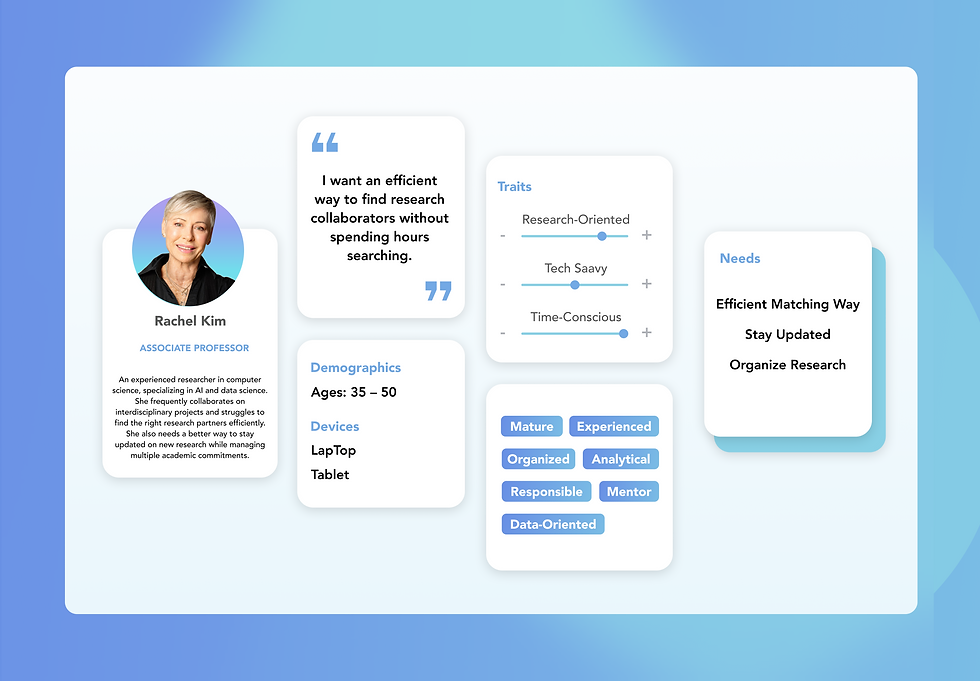
Competitive Analysis
While several platforms exist for academic networking and research collaboration, Colley stands out by addressing key inefficiencies with AI-driven solutions.
Platforms like LinkedIn and ResearchGate provide broad networking opportunities but lack precise research-based matchmaking.
Orbiit.AI offers AI-powered connections, but it focuses on general professional networking rather than academic partnerships.
Academia.edu supports research sharing but does not facilitate direct collaboration or project management.
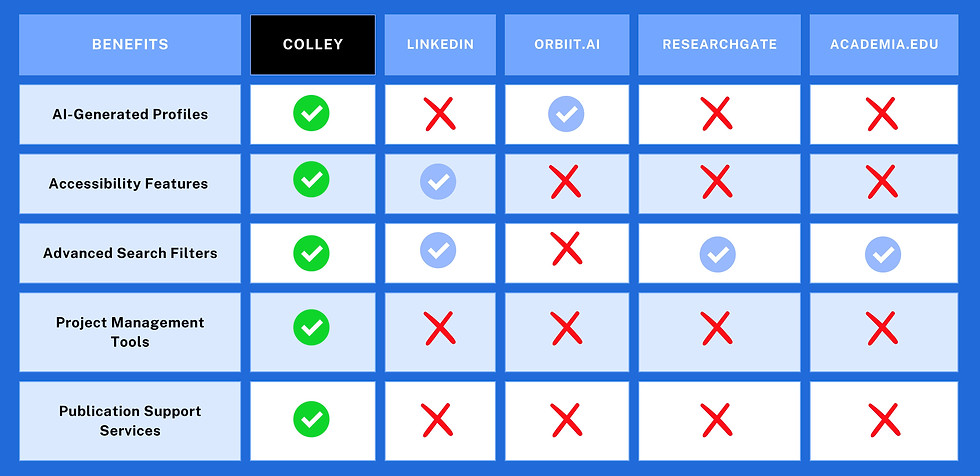
Ideation

An app fostering the research collaborations.
After analyzing existing research networking platforms like LinkedIn, ResearchGate, and Academia.edu, we realized they weren’t necessarily helping researchers find collaborators more effectively. Many platforms focus on broad networking rather than addressing the specific needs of academic partnerships. Researchers often spend excessive time searching for the right collaborators, managing scattered research materials, and keeping up with new publications. We wanted to create a more efficient, AI-powered solution that connects researchers based on shared interests and streamlines knowledge discovery.
That’s when the idea for Colley came to life—an intelligent platform designed to simplify collaboration, automate research updates, and optimize project management. More than just a networking tool, Colley aims to create an empowered, informed, and highly efficient academic space, ensuring that researchers can focus on meaningful work instead of time-consuming administrative tasks.
User Flow

The Colley user flow is designed to provide a seamless experience for researchers and students seeking academic collaboration. The process begins with Login/Sign-up, where users identify as either established researchers or students with research interests. They then proceed to set up their profile, which can be created manually or generated automatically using AI based on LinkedIn or personal website data. After reviewing and editing their profile, users land on the Home Page, where they can access research opportunities. From there, they can utilize advanced filters to refine their search, allowing the system to recommend the top 10 most relevant matches. Users can then decide whether to connect with suggested collaborators, ensuring an efficient and tailored approach to research networking.
Prototype

Mobile

Laptop 1
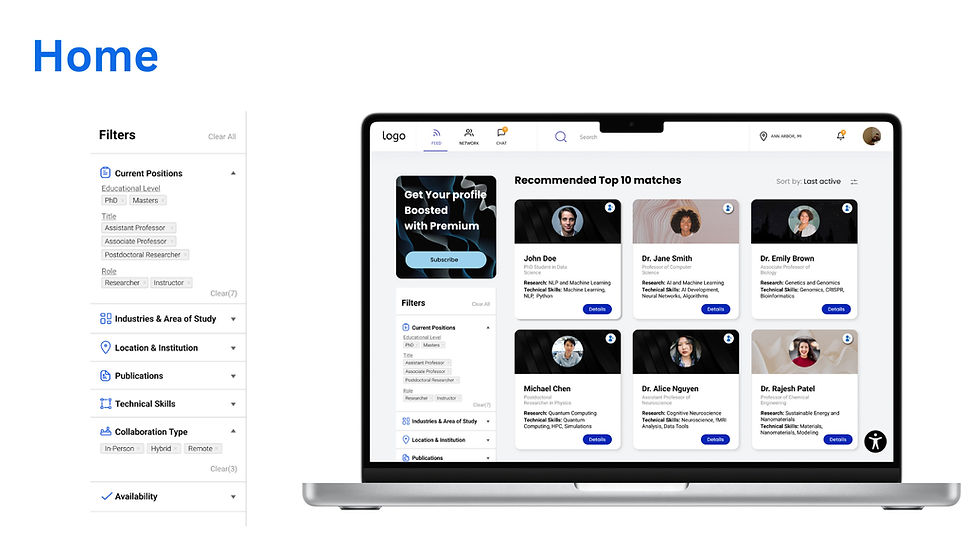
Laptop 2
Technical Architecture
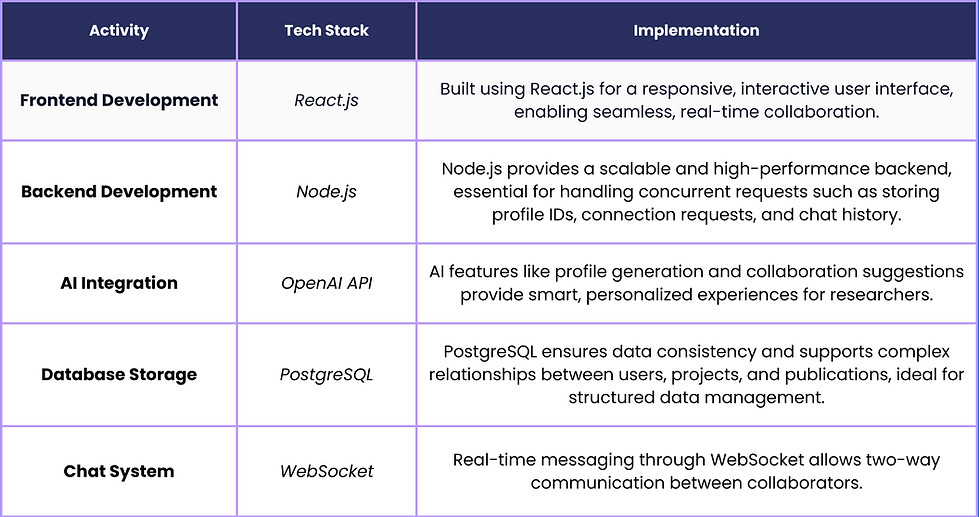
Colley is built on a scalable and high-performance architecture designed for real-world implementation. The frontend leverages React.js to provide an intuitive and responsive user interface, while the backend, powered by Node.js, efficiently handles concurrent requests, including user authentication, profile management, and collaboration matching. PostgreSQL serves as the database, ensuring structured data management for user profiles, research projects, and recommendations. AI-driven features, such as profile generation and collaboration matching, are powered by the OpenAI API, while WebSockets enable real-time messaging and seamless communication between researchers. With a focus on practical deployment, Colley is being developed for actual implementation, ensuring its usability and impact in academic research collaboration.
Business Model
Colley operates on a freemium model to drive user growth and engagement while offering premium features for enhanced research collaboration. The Standard (free) plan provides essential tools, including AI-generated profiles, direct messaging, full access to publications, and project management tools, ensuring accessibility for all researchers. The Premium plan ($8.99/month) unlocks advanced features such as AI-powered collaborator matching, advanced search filters, boosted profiles for increased visibility, and publication endorsements. This tiered approach ensures that all users benefit from core functionalities while offering additional value for those seeking more efficient and targeted research networking.

Marketing Sizing
Colley targets a large and expanding research collaboration market, leveraging AI-driven tools to enhance academic networking and productivity.

Total Addressable Market (TAM) – $34.6B: Represents the global academic research market, including researchers, institutions, and funding agencies seeking collaboration and knowledge-sharing tools.
Serviceable Addressable Market (SAM) – $2.4B: Focuses on the U.S. research market, where academic professionals and students actively engage in research partnerships.
Serviceable Obtainable Market (SOM) – $120M: Colley’s initial target market, aiming to capture a segment of researchers, universities, and academic professionals who need AI-powered matchmaking, project management, and research discovery solutions.
By tapping into this market, Colley positions itself as a high-value platform designed to streamline collaboration and drive innovation in the research community.
RoadMap
